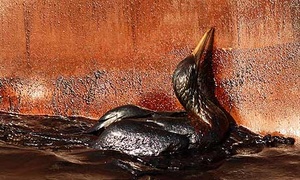
Joint letter – ICC reform and expansion risks diverting ETS Revenues from real climate action
In light of the European Commission’s ongoing considerations to amend the ETS State Aid Guidelines, revising the rules for Indirec...
News

Publish date: April 6, 2011
News
Transocean announced earlier this week that it was distributing huge bonuses to its top executives for making 2010 the “best year” in safety the company had experienced, notwithstanding the death of 11 workers aboard the Deepwater Horizon rig, nine of which were Transocean employees.
Bellona’s president Frederic Hauge said Monday he was “disgusted” by the bonus announcement.
“It is incredibly provocative that a company that is jointly responsible for such poor safety that 11 people die, chooses to give itself bonuses for good saftey that very same year,” said Hauge.
Mark Lanier, a Houston lawyer who is representing clients who have claims in the spill, said of the bonuses: “Some things are just gross.”
The executives who received bonuses where identified by CNN as Chief Executive Officer Steve Newman; Ricardo H. Rosa, senior vice president and chief financial officer; Arnaud A.Y. Bobillier, executive vice president, asset and performance; Eric Brown, executive vice president, legal and administration; and Ihab M. Toma, executive vice president, global business.
The five will donate more than $250,000 to the Deepwater Horizon Memorial Fund, which Transocean established, CNN reported, though it is unclear how much of each executive’s bonus that donation represents or if the $250,000 donation is collective or individual from each executive. US corporate executive bonuses in the financial and industrial sector rouitinely top a million dollars.
The fund has distributed more than $1.6 million to the 11 families of the perished workers.
In a statement Tuesday, CEO Newman said in a statement that, “The executive team made this decision because we believe it is the right thing to do. Nothing is more important to Transocean than our people, and it was never our intent to diminish the effect the Macondo [Deepwate Horizon] tragedy has had on those who lost loved ones.”
“We offer our most sincere apologies and we regret the impact this matter has had on the entire Transocean family,” his statement read.
Transocean continues to maintain that that BP is solely responsible for the oil spill. BP contends that Transocean shares liability. A presidential commission determined that BP and Transocean shared responsibility for cutting costs an safety measures that led to the blowout.
The Deepwater Horizon blast – caused by an avoidable hydrogen “kick,” or gas emission up the drilling column – unleashed an oil gusher in the Gulf of Mexico that BP, who was leasing the Deepwater Horizon rig from Transocean, took three months to clog, resulting in the worst accidental oil spill in history and coating the Gulf with 205.6 million US gallons, or 4.9 million barrels of oil.
The environmental and economic damage could take years to tally.
Transocean uses two safety criteria to calculate executive bonuses, said the Wall Street Journal: the rate of incidents per 200,000 hours that employees work, and the potential severity of those incidents. In 2010, the rate of incidents dropped by 4 percent from 2009. A number that measures potential severity of those incidents fell nearly 15 percent from last year.

In light of the European Commission’s ongoing considerations to amend the ETS State Aid Guidelines, revising the rules for Indirec...

The 5th Industrial Carbon Management (ICM) Forum took place this year on 8-9 December in Athens, Greece, co-hosted by the European Commission an...

Today, the European Commission published a series of Carbon Border Adjustment Mechanism(CBAM)-related documents including two legislative proposals a...

Today, the European Commission published its European Grids Package, presented as an upgrade of the EU’s energy infrastructure to lower bills and boo...

The European Commission is set to publish the the Grids Package on December 10th, the different legislative proposals and secondary legislations rela...
Get our latest news